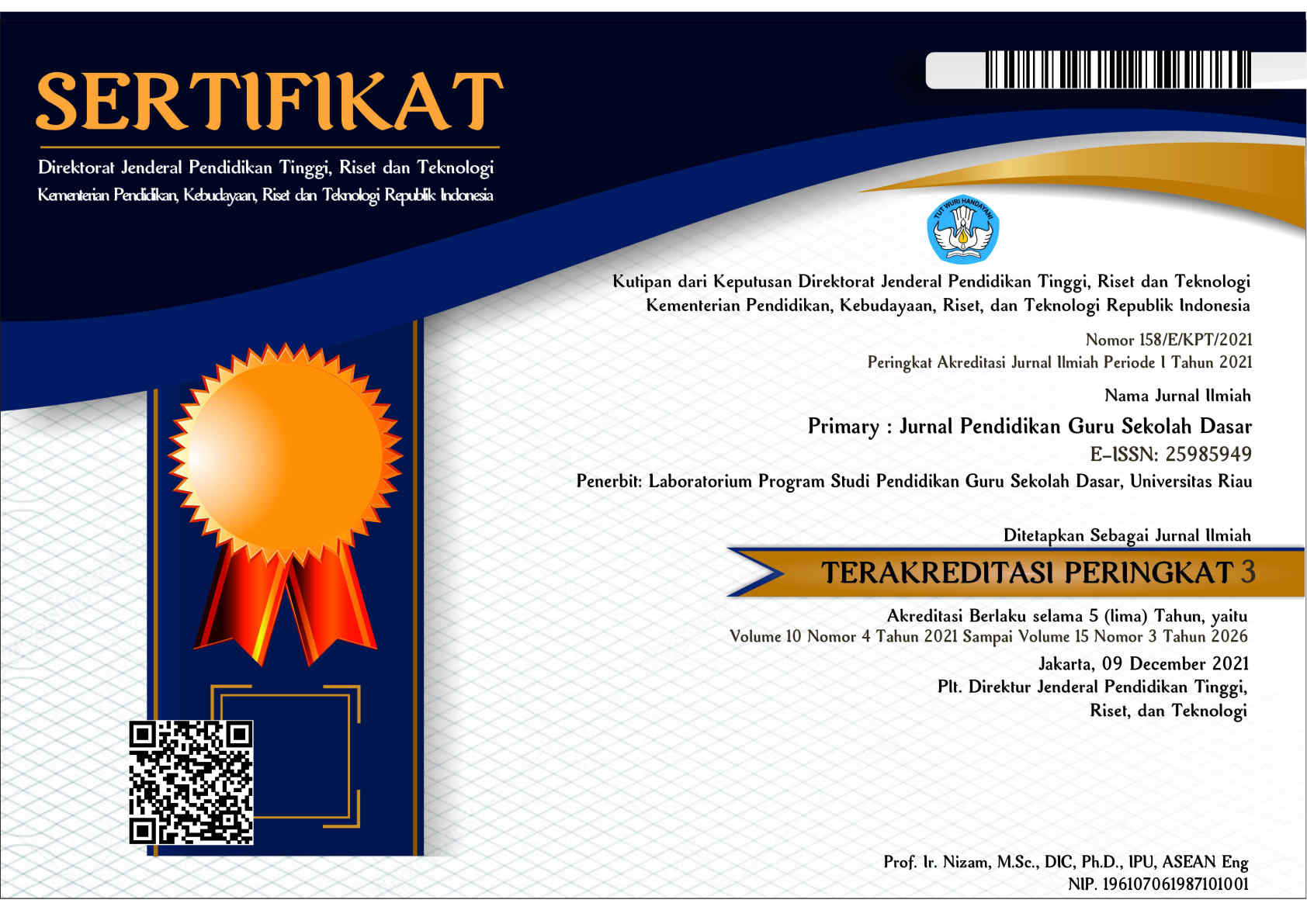DISPOSITION ANALYSIS OF ELEMENTARY SCHOOL STUDENTS IN MATHEMATICAL PROBLEM SOLVING
Abstract
The role of students' attitudes (disposition) towards mathematics is an important element in solving mathematical problems and must be maximized properly. Disposition has the following indicators: self-confident, flexibility, persistent, curiosity, reflecting, apply it. This study aims to describe the elementary students' mathematical disposition profile towards problem solving abilities. The research method uses qualitative-descriptive. Data were collected through questionnaires, observations, and interviews then analyzed by triangulation technique. The results show that there is a significant relationship between elementary school students' mathematical dispositions to problem solving abilities. Students who meet the "excellent" category of mathematical disposition indicators (mathematical disposition indicators score > 85%) have good problem solving skills. Furthermore, students who are categorized as "less" (mathematical disposition indicators score < 60%) have problem solving abilities that need treatment. Each indicator description is described in this article.
Keywords
Full Text:
PDFReferences
Azmidar, A., Darhim, D., & Dahlan, J. A. (2017). Enhancing Students’ Interest through Mathematics Learning. Journal of Physics: Conference Series, 895(1). https://doi.org/10.1088/1742-6596/895/1/012072
Barrett, D., & Twycross, A. (2018). Data collection in qualitative research. Evidence-Based Nursing, 21(3), 63–64. https://doi.org/10.1136/eb-2018-102939
Cahyaningsih, U., & Nahdi, D. S. (2021). The Effect of Realistic Mathematics Education on Elementary Students’ Critical Thinking Skills. Journal of Physics: Conference Series, 1764(1). https://doi.org/10.1088/1742-6596/1764/1/012127
Callingham, R., & Siemon, D. (2021). Connecting multiplicative thinking and mathematical reasoning in the middle years. Journal of Mathematical Behavior, 61(December 2020), 100837. https://doi.org/10.1016/j.jmathb.2020.100837
Campbell, S., Greenwood, M., Prior, S., Shearer, T., Walkem, K., Young, S., Bywaters, D., & Walker, K. (2020). Purposive sampling: complex or simple? Research case examples. Journal of Research in Nursing, 25(8), 652–661. https://doi.org/10.1177/1744987120927206
City, Q. (2021). Impact of Interactive Pedagogies on Students’ Academic Achievement in Mathematics at Elementary School Level in Quetta City, Balochistan. İlköğretim Online, 20(3), 262–270. https://doi.org/10.17051/ilkonline.2021.03.26
Creswell, J. W., Hanson, W. E., Clark Plano, V. L., & Morales, A. (2007). Qualitative Research Designs: Selection and Implementation. The Counseling Psychologist, 35(2), 236–264. https://doi.org/10.1177/0011000006287390
Cui, S., Zhang, C., Wang, S., Zhang, X., Wang, L., Zhang, L., Yuan, Q., Huang, C., Cheng, F., Zhang, K., & Zhou, X. (2021). Experiences and attitudes of elementary school students and their parents toward online learning in China during the COVID-19 pandemic: Questionnaire study. Journal of Medical Internet Research, 23(5), 1–12. https://doi.org/10.2196/24496
Irawan, S., & Iasha, V. (2021). B U A N A P E N D I D I K A N Model Pembelajaran Core Dan Disposisi Matematis, Terhadap Kemampuan Pemecahan Masalah Matematika Siswa Sekolah Dasar. Buana Pendidikan, 17(2), 122. http://jurnal.unipasby.ac.id/index.php/jurnal_buana_pendidikan/index
Jiang, R., Liu, R. de, Star, J., Zhen, R., Wang, J., Hong, W., Jiang, S., Sun, Y., & Fu, X. (2021). How mathematics anxiety affects students’ inflexible perseverance in mathematics problem-solving: Examining the mediating role of cognitive reflection. British Journal of Educational Psychology, 91(1), 237–260. https://doi.org/10.1111/bjep.12364
Mariamah, M., Ratnah, R., Katimah, H., Rahman, A., & Haris, A. (2021). Analysis of Students’ Perceptions of Mathematics Subjects: Case studies in Elementary Schools. Journal of Physics: Conference Series, 1933(1). https://doi.org/10.1088/1742-6596/1933/1/012074
Minarti, E. D., Alghadari, F., & Hutajulu, M. (2020). Mathematical disposition ability and critical thinking: Evaluation of middle school students. Journal of Physics: Conference Series, 1657(1). https://doi.org/10.1088/1742-6596/1657/1/012017
Mohyuddin, R. G., & Khalil, U. (2016). Misconceptions of students in learning mathematics at primary level. Bulletin of Education and Research, 38(1), 133–162.
Munafiah, S., Rochmad, R., & Dwijanto, D. (2023). Unnes Journal of Mathematics Education Research Mathematical Creative Thinking Ability in terms of Mathematical Disposition in Creative Problem Solving Learning with an Open Ended Approach. Unnes Journal of Mathematics Education Research, 12(1), 30–37. http://journal.unnes.ac.id/sju/index.php/ujmer
Oppermann, E., & Lazarides, R. (2021). Elementary school teachers’ self-efficacy, student-perceived support and students’ mathematics interest. Teaching and Teacher Education, 103, 103351. https://doi.org/10.1016/j.tate.2021.103351
Raccanello, D., Brondino, M., Moè, A., Stupnisky, R., & Lichtenfeld, S. (2019). Enjoyment, Boredom, Anxiety in Elementary Schools in Two Domains: Relations With Achievement. Journal of Experimental Education, 87(3), 449–469. https://doi.org/10.1080/00220973.2018.1448747
Sarı, M. H., & Yüce, E. (2020). Problems experienced in classrooms with students from different cultures. Journal on Efficiency and Responsibility in Education and Science, 13(2), 90–100. https://doi.org/10.7160/eriesj.2020.130204
Snyder, H. (2019). Literature review as a research methodology: An overview and guidelines. Journal of Business Research, 104(July), 333–339. https://doi.org/10.1016/j.jbusres.2019.07.039
Suhaedi, D., Fajar, M. Y., Sukarsih, I., & Permanasari, Y. (2020). Analysis of instruments and mathematical disposition using Rasch model. IOP Conference Series: Materials Science and Engineering, 830(2). https://doi.org/10.1088/1757-899X/830/2/022003
Suryaningrat, E. F., Muslihah, N. N., Pujiasti, D. A., & Adiredja, R. K. (2021). The influence of Lectora inspire-based interactive learning media on students’ learning motivation and mathematical reasoning abilities in primary schools. Journal of Physics: Conference Series, 1987(1). https://doi.org/10.1088/1742-6596/1987/1/012035
Sutama, S., Anif, S., Prayitno, H. J., Narimo, S., Fuadi, D., Sari, D. P., & Adnan, M. (2021). Metacognition of Junior High School Students in Mathematics Problem Solving Based on Cognitive Style. Asian Journal of University Education, 17(1), 134–144. https://doi.org/10.24191/ajue.v17i1.12604
Ulia, N., & Kusmaryono, I. (2021). Mathematical disposition of students’, teachers, and parents in distance learning: A survey. Premiere Educandum : Jurnal Pendidikan Dasar Dan Pembelajaran, 11(1), 147. https://doi.org/10.25273/pe.v11i1.8869
Wu, J., Guo, R., Wang, Z., & Zeng, R. (2021). Integrating spherical video-based virtual reality into elementary school students’ scientific inquiry instruction: effects on their problem-solving performance. Interactive Learning Environments, 29(3), 496–509. https://doi.org/10.1080/10494820.2019.1587469
Yaniawati, R. P., Indrawan, R., & Setiawan, G. (2019). Core model on improving mathematical communication and connection, analysis of students’ mathematical disposition. International Journal of Instruction, 12(4), 639–654. https://doi.org/10.29333/iji.2019.12441a
Yulita & Ain, S. Q. (2021). Analysis of Students’ Learning Difficulties in Learning Mathematics at Elementary Schools. AL-ISHLAH: Jurnal Pendidikan, 13(2), 892–899. https://doi.org/10.35445/alishlah.v13i2.745
DOI: http://dx.doi.org/10.33578/jpfkip.v12i1.9588
Refbacks
Copyright (c) 2023 Riandi Marisa, Yulia Santi, Ety Mukhlesi Yeni, Sri Dewi Nirmala

This work is licensed under a Creative Commons Attribution-NonCommercial-ShareAlike 4.0 International License.
____________________________________________________________
Primary: Jurnal Pendidikan Guru Sekolah Dasar
Secretariat
Program Studi Pendidikan Guru Sekolah Dasar
Gedung B1, FKIP Universitas Riau
Kampus Bina Widya Km. 12,5 Simpang Baru Panam
Pekanbaru Riau Indonesia 28293
e-mail : primary@ejournal.unri.ac.id



